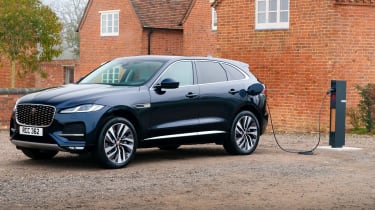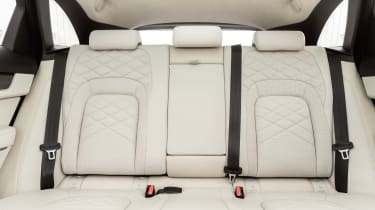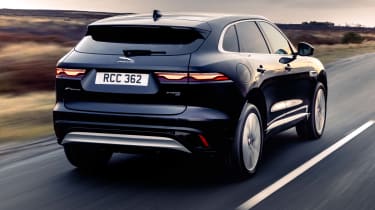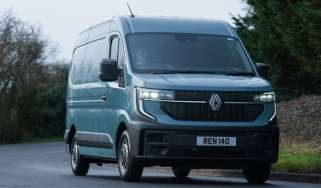Jaguar F-Pace hybrid review
Despite the extra weight of its hybrid system's batteries, the Jaguar F-Pace P400e remains one of the best cars in its class to drive – but it’s not perfect
Pros
- Good fun to drive
- Quiet and refined
- Standard rapid charging
Cons
- Suspension is quite stiff
- Compromised boot space
- Relatively short electric range
| Car type | Electric range | Fuel economy | CO2 emissions |
|---|---|---|---|
| Plug-in hybrid | 33 miles | 113-130mpg | 49-54g/km |
Jaguar has committed to a fully electric future, but before it gets there, a selection of hybrid models will help to – if you’ll excuse the pun – 'plug the gap'. The F-Pace is very much among those, and along with a fairly extensive mid-life facelift, has now been given plug-in hybrid (PHEV) power for the first time.
The facelift saw a raft of new engines added to the range, as well as extensive visual tweaks inside and out. Every model gets new lights front and rear, fresh bumpers and a handful of new wheel designs. In the cabin, the biggest change is Jaguar’s latest Pivi Pro infotainment system; a night-and-day improvement on the laggy setup that went before.
The old cliche of suggesting Jaguar has done little more than stick an iPad to the dashboard certainly rings true at first glance. While it looks slick – clean, with no surrounding buttons or switches – it stands proud of the dashboard’s otherwise well considered design. Still, the graphics are sharp and it’s pretty responsive, plus Apple CarPlay and Android Auto phone connectivity are standard.
Quality has also stepped up a notch. Everything you touch is covered in luxurious leather, metal or gloss plastic, and all the switches – including the rotary climate controls – operate with the solidity you’d expect of a car costing more than £50,000. Even the basic F-Pace plug-in comes with 12-way power-adjustable heated front seats.
Badged P400e, the F-Pace plug-in hybrid is available in all but the very cheapest of the SUV’s four trim levels. Using a 17.1kWh battery linked to a 140bhp motor, the F-Pace is capable of a claimed 33 miles on electric power alone; the car also uses a 296bhp four-cylinder turbocharged petrol engine for a combined 398bhp and 640Nm of torque.
During our time with the car, we saw 27-28 miles on a full battery; not particularly impressive compared to larger PHEVs like the BMW X5 xDrive45e, but on par with similarly sized rivals. The big news, as far as the F-Pace (and its smaller E-Pace P300e sibling) is concerned, is the fact that every model comes with 32kW DC rapid charging as standard. Unusual on plug-in hybrid models like this, the Jaguar’s connector allows owners to top up to 80% in just 30 minutes.
In reality, however, few F-Pace drivers will make regular use of this, so a slower 7kW wallbox top-up time is perhaps more relevant. Using an appropriate home or public charger will refill the battery to 80% in an hour and 40 minutes, while a 3kW feed takes just over twice as long.
The electric range and the low CO2 emissions mean this is the first F-Pace to offer genuine appeal to company-car drivers. However, which band it sits in depends on specification and wheel size – with only the very cheapest versions falling into the 13% bracket for the 2021/22 financial year; top-spec models command a 15% rating.
Elsewhere, the F-Pace’s packaging and placement of the electrical systems means boot space is reduced, and there’s no significant underfloor storage, meaning you’ll need to keep your charge cables at home or leave them alongside your luggage. Headroom in the rear isn’t all that generous, either. A BMW X3 is more practical in this regard.
On the road, it’s safe to say that the Jaguar F-Pace retains its title as one of the most engaging cars in its class – even with the added weight of the P400e’s plug-in hybrid system. The steering is well weighted and there’s little in the way of body lean – even through faster changes of direction. It’s perhaps a little stiffly sprung, which can cause it to fidget at lower speeds, but things smooth out the faster you go, making the F-Pace a fantastic cruiser.
That’s only emphasised by the car’s hushed cabin. The engine is barely audible, even at higher revs, settling down to near-silence on the motorway. Switching the F-Pace to its Dynamic drive mode fills the cabin with augmented exhaust noise, adding little to the driving experience. But make no mistake, this new P400e model is no slouch. The benchmark 0-62mph sprint takes 5.3 seconds, and with the added shove of the electric motor it feels every bit as quick as that figure suggests. In-gear response is good, too.
In addition to the usual Eco, Comfort and Dynamic drive modes, the P400e can also be toggled through EV, Hybrid and Save. The first of those settings will hold the car in electric power right up to 87mph, and while it doesn’t have the shove of a pure-electric car, power is plentiful to allow gentle everyday driving.
Hybrid works well, too, switching between petrol and electric without interruption. Compared to a Mercedes GLC 300 e, it’s perhaps less inclined to switch straight back to battery power at the earliest opportunity, but the Jaguar seems to manage its two energy sources pretty effectively. Save holds your remaining battery power for use later in your journey.
As mentioned, the P400e powertrain is available on all but the entry-level F-Pace. That means that every version (starting with the cheapest P400e S) gets 19-inch wheels, a powered tailgate, electric leather seats, that 11.4-inch Pivi Pro system, plus a 3D reversing camera and all-round parking sensors.
Upgrade to the SE and you’ll add keyless entry, auto high beam and scrolling indicators, as well as bigger wheels, better seats and extra driver assistance systems. HSE brings quilted leather seats, a suede headliner, ash veneer in the cabin and a Meridian stereo. You can add the R-Dynamic package to S, SE and HSE, with these models benefiting from sportier styling, gloss black wheels and leather sports seats.






